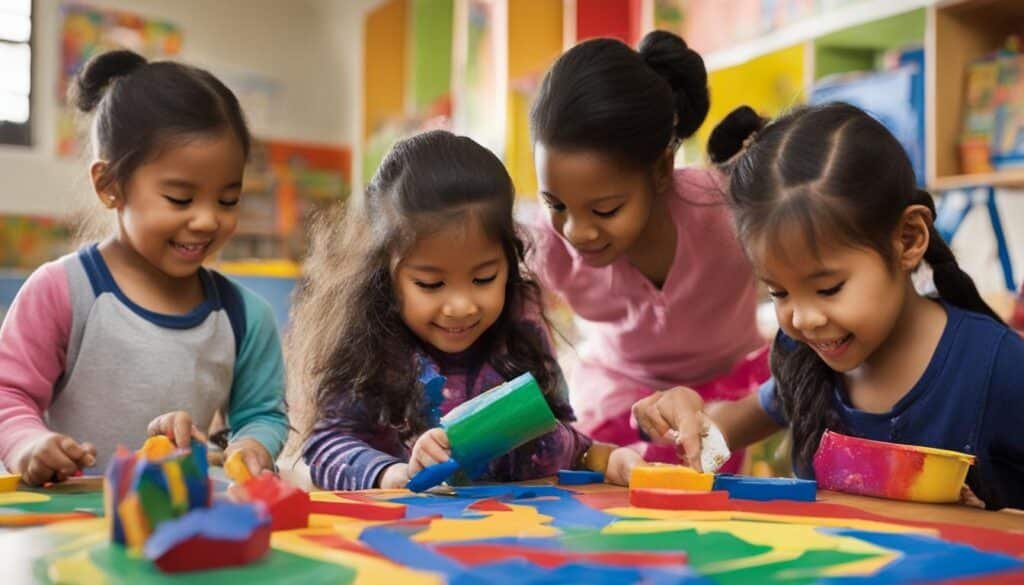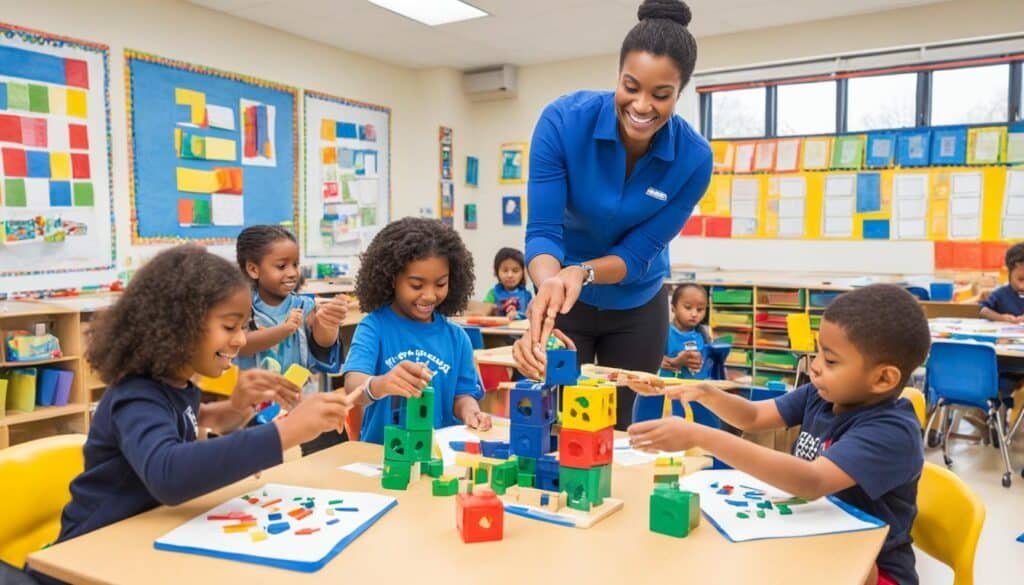Early childhood education degrees are designed to equip students with the essential skills to support the learning and development of young children. The first five years of a child’s life are critical for brain development, making this field of study vital for those who love working with young children.
Also Read: Choosing The Right University Degree Program
If you are considering a career in early childhood education, it is important to choose a program that offers a comprehensive curriculum and prepares you for success in this rewarding field. To help you navigate through the myriad of options available, we have compiled a guide to the top early childhood education programs.
Key Takeaways:
- Early childhood education degrees provide the necessary skills to work with young children.
- The first five years of a child’s life are crucial for brain development.
- Featured online colleges for early childhood education include Florida International University, Charter Oak State College, Oakland City University, Winona State University, and Chaminade University of Honolulu.
- Choosing a program that aligns with your goals and offers a well-rounded curriculum is paramount.
- Consider factors such as affordability, student outcomes, reputation, and diversity when selecting a program.
Bachelor’s in Early Childhood Education Program Rankings
When it comes to pursuing a bachelor’s degree in early childhood education, there are several outstanding programs available online. These programs offer comprehensive courses that cover curriculum development, teaching methods, child development, and assessments. To help you narrow down your options, here are the top 5 bachelor’s programs in early childhood education:
| University | Location |
|---|---|
| Florida International University | Miami, FL |
| Charter Oak State College | New Britain, CT |
| Oakland City University | Oakland City, IN |
| Winona State University | Winona, MN |
| Chaminade University of Honolulu | Honolulu, HI |
These programs have been ranked based on various factors including affordability, student outcomes, reputation, and diversity. Each university has a unique approach to early childhood education, providing students with the necessary skills and knowledge to excel in their careers.
By choosing one of these top-ranked online programs, you can pursue your bachelor’s in early childhood education from the comfort of your own home, while still receiving the highest quality education. Whether you’re just starting your journey or looking to advance your career, these programs offer the flexibility and accessibility you need to succeed.
When considering which program to enroll in, it’s essential to carefully evaluate each university’s curriculum, faculty, and resources. By selecting an accredited program with a strong reputation, you can ensure that you are receiving a high-quality education that will help you thrive in the field of early childhood education.
Also Read: Navigating University Admissions With Ease
What Will I Learn in an Early Childhood Education Program?
In an early childhood education program, students will learn instructional strategies, teaching techniques, and theories of early childhood development for children aged eight and younger. The program focuses on providing a foundational education in areas such as language and literacy development, mathematical learning, and child well-being.
Common courses may include:
- Literature and Young Children: Explore how literature can enhance the cognitive and socio-emotional development of young children.
- Children with Special Needs: Learn about inclusive practices and effective strategies to support children with diverse abilities.
- Program Administration: Gain knowledge and skills related to managing and overseeing early childhood education programs.
- Leadership and Supervision: Understand the principles of effective leadership and supervision in early childhood settings.
- Partnerships with Families and Communities: Explore the importance of collaboration and working with families and community organizations to support children’s development and learning.
Additionally, students may have the opportunity to gain practical experience through internships or fieldwork placements, where they can apply their knowledge and skills in real educational settings. These experiences provide valuable hands-on learning and allow students to observe and interact with young children under the guidance of experienced educators.
Sample Coursework
To provide a clearer picture of the curriculum in an early childhood education program, here is a sample coursework table:
| Course Title | Description |
|---|---|
| Literature and Young Children | Explore the role of literature in young children’s cognitive and socio-emotional development. Learn how to select and use age-appropriate literature in educational settings. |
| Children with Special Needs | Understand the diversity of children’s abilities and learn strategies to create inclusive environments and support children with special needs. |
| Program Administration | Develop skills in program planning, budgeting, and management. Learn about licensing requirements, policy development, and staff supervision in early childhood education programs. |
| Leadership and Supervision | Gain knowledge and skills related to effective leadership and supervision in early childhood education settings. Explore strategies for building positive relationships with staff, families, and the community. |
| Partnerships with Families and Communities | Examine the importance of collaboration and partnerships with families and community organizations. Learn strategies for building strong relationships and involving families in children’s education. |
Through these courses and practical experiences, an early childhood education program prepares students to become knowledgeable and skilled educators who can make a positive impact on the lives of young children.
Also Read: University Of Utah Medical School Admissions
Licensure vs. Non-Licensure Programs
When considering an early childhood education program, it’s essential to understand the difference between licensure and non-licensure programs. Online early childhood education degree programs often offer both options, each with its own advantages and considerations.
Licensure programs focus on providing students with the necessary educational and teaching requirements to pursue an initial teaching license. These programs typically include coursework in pedagogy, child development, curriculum design, and assessment. In addition, licensure programs often include valuable hands-on experiences such as student-teaching opportunities and mentorship programs.
On the other hand, non-licensure programs do not guarantee meeting state licensing requirements. While they still provide a comprehensive education in early childhood education, these programs may not offer specific coursework or experiences required for licensure. Non-licensure programs are typically designed for individuals who do not intend to pursue a teaching license but are interested in other roles within the field of early childhood education, such as program administration or educational advocacy.
“Licensure programs prepare students with the foundational knowledge and practical experience needed to excel in the teaching profession, while non-licensure programs offer flexibility for individuals interested in diverse career paths within early childhood education.”
It’s important to carefully consider your career goals and aspirations when choosing between licensure and non-licensure programs. If you are certain about pursuing a career as a licensed early childhood education teacher, a licensure program is the most suitable option. However, if you are interested in positions that do not require a teaching license or prefer a more flexible educational path, a non-licensure program may be the better fit.
Ultimately, both licensure and non-licensure programs provide valuable opportunities for individuals passionate about early childhood education. By understanding the distinctions between the two, you can make an informed decision that aligns with your professional aspirations.
Licensure Program Features
- Comprehensive coursework in pedagogy, child development, curriculum design, and assessment
- Student-teaching experiences and mentorship programs
- Preparation for pursuing an initial teaching license
Non-Licensure Program Features
- Flexibility for diverse career paths within early childhood education
- Coursework in program administration, educational advocacy, and other non-teaching roles
- May not fulfill state licensing requirements
When choosing between licensure and non-licensure programs, it’s important to consider your long-term career goals and desired role within the field of early childhood education. With the right program, you can gain the knowledge and skills needed to make a meaningful impact on the lives of young children and their families.
Why Should I Earn My Early Childhood Education Degree Online?
Earning an early childhood education degree online offers flexibility, self-driven learning, and numerous benefits for individuals looking to pursue a career in this field. Whether you’re a working professional, a parent, or someone seeking a career change, online programs provide the opportunity to balance classes, work, and childcare obligations effectively.
Also Read: American University Law School Admissions & Programs
Online early childhood education programs are well-suited for individuals who prefer a self-driven learning environment. With online courses, you have the freedom to study at your own pace, giving you the flexibility to manage your time effectively and tailor your learning experience to suit your needs.
Moreover, online programs often incorporate neurodivergent-friendly learning methods, accommodating different learning styles and providing a supportive and inclusive education environment.
By pursuing an online degree in early childhood education, you can gain the necessary knowledge and skills to work with young children while accommodating your personal and professional commitments. Whether you aspire to become a teacher, an administrator, or an advocate for early childhood development, an online program offers the flexibility, convenience, and quality education you need to succeed.
Benefits of Earning an Early Childhood Education Degree Online:
- Flexibility to balance classes, work, and childcare obligations
- Self-driven learning environment suited for different learning styles
- Neurodivergent-friendly learning methods
- Convenient access to quality education
“Earning an early childhood education degree online allows individuals to gain the knowledge and skills needed to work with young children, all while accommodating their personal and professional commitments.”
With the increasing demand for qualified early childhood educators, an online early childhood education degree provides a flexible and accessible pathway to pursue your passion while maintaining a balanced lifestyle. Embrace the benefits of online learning and embark on a rewarding career shaping the lives of young learners.
Program in Early Childhood Education at Teachers College, Columbia University

Teachers College, Columbia University offers a highly regarded program in early childhood education that prepares educators to teach and support young children in diverse contexts. The program is dedicated to fostering equity and inclusion, with a focus on recognizing and nurturing children’s inherent capacities for learning and development.
Also Read: Pharmacy Technician Online Course: Get Certified
At Teachers College, Columbia University, students have the opportunity to pursue M.A. degrees in Early Childhood Education with a specialization in birth-2nd grade certification. This comprehensive program provides a solid foundation in early childhood education theories, research, and effective instructional practices.
The program also offers Ed.D. degrees in Early Childhood Education and Early Childhood Policy, providing students with advanced knowledge and skills to assume leadership roles in the field of early childhood education.
| Degree | Specialization | Certification |
|---|---|---|
| M.A. | Early Childhood Education | Birth-2nd grade certification |
| Ed.D. | Early Childhood Education | N/A |
| Ed.D. | Early Childhood Policy | N/A |
The early childhood education program at Teachers College, Columbia University emphasizes hands-on experiences, reflective practice, and collaboration with families and communities. Students gain practical skills through fieldwork, observations, and internships in various educational settings.
Graduates from Teachers College, Columbia University’s early childhood education program are well-prepared to make a positive impact in the lives of young children, creating engaging and supportive learning environments that foster their cognitive, social, and emotional development.
Early Childhood Education Programs in New York

In New York, there are several universities that offer early childhood education degree programs. These programs provide opportunities for individuals to obtain a Bachelor’s or Master’s degree in early childhood education, preparing them to become teachers or educational leaders in the field.
- College of Mount Saint Vincent
- New York University
- Grand Canyon University
- Yeshiva University
- Capella University
- CUNY Lehman College
- Monroe College – Bronx/New Rochelle
- The City College of New York
- Brooklyn College
These universities offer comprehensive and rigorous early childhood education programs designed to equip students with the knowledge and skills needed to work effectively with young children. Whether individuals are interested in teaching in preschools, kindergartens, or elementary schools, these programs provide the necessary training and preparation for a successful career in early childhood education.
Students enrolled in these programs can expect to study a wide range of subjects, including child development, curriculum design, assessment methods, and classroom management techniques. By engaging in both theoretical coursework and practical experiences, students gain the necessary knowledge and hands-on skills to support the growth and development of young learners.
By pursuing an early childhood education degree in New York, individuals have the opportunity to learn from experienced faculty, collaborate with peers, and access resources and support networks specific to the region. Additionally, many programs offer partnerships with local schools and educational organizations, providing students with valuable opportunities for field placements and real-world experience.
Whether aspiring educators or current professionals looking to advance their careers, the early childhood education programs in New York offer a rich and diverse educational landscape that prepares individuals to make a lasting impact on the lives of young children.
New York University Early Childhood Education Program
New York University (NYU) offers a comprehensive Bachelor of Science program in Early Childhood Education and Early Childhood Special Education. This program is designed to prepare students to become skilled educators who can effectively teach children from birth through grade 6. Upon completion of the program, graduates receive a New York State dual certification, opening up a range of career opportunities in the field.
The NYU Early Childhood Education program covers core subjects, teaching strategies, and childhood development, providing students with a strong foundation for their future careers. Emphasizing both theoretical knowledge and practical skills, the curriculum equips students with the necessary tools to create inclusive and engaging learning environments for young children.
Students enrolled in the NYU Early Childhood Education program have the flexibility to choose between full-time and part-time formats, allowing them to balance their studies with other commitments. With a focus on experiential learning, students have the opportunity to apply their classroom knowledge in real-world settings through fieldwork and internships.
To graduate from the program, students must complete a total of 128-134 credits, including coursework in subjects such as:
- Child Development and Psychology
- Curriculum Design and Instructional Strategies
- Language and Literacy Development
- Mathematics Education
- Social and Emotional Learning
The NYU Early Childhood Education program offers a supportive learning environment, with dedicated faculty members who are experts in their respective fields. Students benefit from small class sizes, allowing for personalized attention and mentoring.
Whether students aspire to become classroom teachers, curriculum developers, or educational leaders, the NYU Early Childhood Education program provides the knowledge, skills, and credentials needed to excel in the field of early childhood education.
At NYU, we believe in the power of early childhood education to shape young minds and transform lives. Our program combines academic rigor with hands-on experiential learning, preparing students to become compassionate and effective educators. Join us at NYU and make a difference in the lives of young children.
Yeshiva University Early Childhood Education Program
Yeshiva University’s Stern College for Women offers an early childhood education program that prepares students to become teachers for young children. The program includes a major in early childhood education and childhood education, leading to New York State Initial Teacher Certification. Students gain theoretical knowledge and practical field experience, learning important concepts such as educational psychology, language and literacy development, and special education methods.
At Yeshiva University, students in the early childhood education program are equipped with the necessary skills and understanding to create engaging and inclusive learning environments for young children. The curriculum emphasizes the foundations of early childhood education, focusing on child development, instructional strategies, and pedagogical approaches.
Through a combination of coursework, field experiences, and student teaching, students have the opportunity to apply their theoretical knowledge in real-world settings. Under the guidance of experienced faculty, they develop the necessary skills to effectively teach and support young children’s learning and development.
The Yeshiva University early childhood education program also places a strong emphasis on cultural diversity and equity. Students learn how to create inclusive classrooms that celebrate and respect students’ diverse backgrounds, experiences, and abilities. This prepares them to effectively meet the needs of all learners and promote positive outcomes for every child.
Upon completion of the program, graduates are prepared to pursue a rewarding career in early childhood education, whether in public or private schools, community organizations, or even starting their own early childhood education initiatives.
CUNY Lehman College Early Childhood Education Program

CUNY Lehman College offers a comprehensive early childhood education program that equips students with the knowledge and skills necessary to excel in the field. The program prepares aspiring educators for New York State certification, ensuring they meet the highest standards in early childhood education.
At CUNY Lehman College, students benefit from a curriculum that combines theoretical knowledge with practical field experience. Through hands-on learning opportunities, students can apply their learning in real classroom settings, gaining invaluable experience in working with young children.
In addition to a solid foundation in early childhood education, CUNY Lehman College also provides an opportunity for students to advance their careers through the Master of Science in Education degree program. By pursuing a master’s degree in Early Childhood Education, students can enhance their knowledge and skills, opening up more career prospects and opportunities for professional growth.
Whether students choose to enter the workforce after completing their degree or continue their education with a master’s degree, CUNY Lehman College’s Early Childhood Education Program prepares them to make a positive impact on the lives of young children and contribute to the field of education.
| Program Highlights | Program Format | Duration |
|---|---|---|
| Prepares students for New York State certification | On-campus | Varies |
| Combines theoretical knowledge with practical field experience | Full-time or part-time | Varies |
| Opportunity to pursue a Master of Science in Education degree |
Conclusion
Pursuing a degree in early childhood education equips individuals with the necessary skills and knowledge to make a positive impact on the lives of young children. Whether through online or on-campus programs, there are numerous educational opportunities available for those interested in this field. These programs offer the flexibility to balance personal and professional commitments while providing a pathway to rewarding careers in teaching, curriculum development, leadership, and advocacy.
Early childhood education programs emphasize the critical importance of the first five years of a child’s life in brain development. By gaining expertise in instructional strategies, teaching techniques, and theories of early childhood development, graduates are prepared to support and guide children aged eight and younger. Through courses such as literature and young children, children with special needs, program administration, leadership and supervision, and partnerships with families and communities, students develop a strong foundation in language and literacy development, mathematical learning, and child well-being.
Whether individuals choose to earn their degree online or opt for a university program in New York, early childhood education paves the way for a fulfilling career. These programs not only provide the necessary knowledge and skills but also offer opportunities for personal growth and professional development. With a degree in early childhood education, individuals can contribute to the nurturing and holistic development of young children, shaping their future and making a difference in their lives.
Also Refer : American University Law School Admissions & Programs
FAQs
Q: What are the top early childhood education programs?
A: The top early childhood programs include those offered by renowned universities and colleges preschool, as well as specialized institutions focusing on early childhood development and education.
Q: What is the role of the Department of Education in early childhood education programs?
A: The Department of Education plays a crucial role in setting standards, guidelines, and regulations for early childhood education programs to ensure quality and consistency across providers.
Q: How can I find a reputable child care provider for my child?
A: You can find a reputable child care provider by researching online, seeking recommendations from other parents, and visiting potential facilities to assess their quality of care and education programs.
Q: What are the key components of school readiness in early childhood education?
A: The key components of school readiness in early childhood education include cognitive development, social and emotional skills, language and communication abilities, and physical well-being to prepare children for formal schooling.
Q: What are the eligibility criteria for enrolling a child in early childhood education programs?
A: Eligibility criteria for enrolling a child in early childhood education programs may vary, but commonly include age requirements, residency status, and in some cases, income eligibility for certain programs and services.
Q: How can I pursue a degree in early childhood education?
A: You can pursue a degree in early childhood education by enrolling in accredited colleges or universities offering relevant courses and programs, or by seeking online or hybrid learning options to accommodate your schedule.
Q: What support is available for children with disabilities in early childhood education programs?
A: Early childhood education programs often provide specialized support and services for children with disabilities, including individualized education plans, therapy services, and inclusive learning environments to ensure their developmental needs are met.
Q: What are some common resources for scholarships in early childhood education?
A: Common resources for scholarships in early childhood education include government grants, private foundations, educational institutions, and professional organizations dedicated to supporting individuals pursuing careers in early childhood education.
Q: How can I assess the quality of early childhood education programs?
A: You can assess the quality of early childhood education programs by evaluating factors such as teacher qualifications and training, curriculum and learning activities, safety and hygiene standards, child-teacher ratios, and parent engagement opportunities.
Q: What are the main developmental areas addressed in early childhood education programs?
A: The main developmental areas addressed in early childhood education programs include cognitive development, physical and motor skills, social and emotional learning, language and literacy development, and creative expression through art and play.




